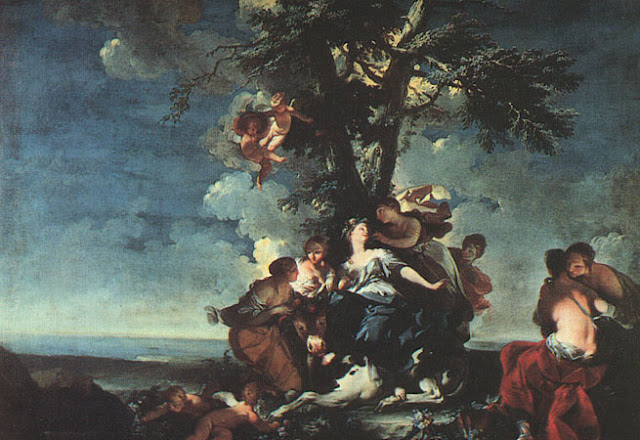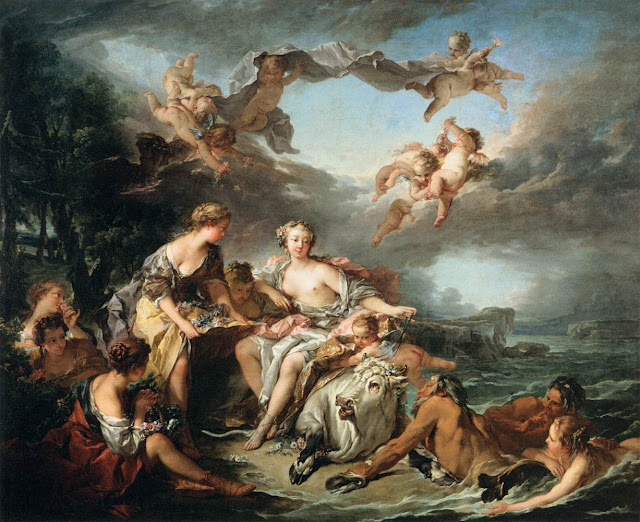I'm going to begin with an excerpt from Ovid's Metamorphoses, I will then repeat sections of the text with the artworks.
Zeus commands one of his many sons to drive some cattle to the beach where Europa is.
"Love
and regal dignity, scarcely the best of friends,
are rarely
discovered together. And so the father and ruler
of all the
gods, whose right hand wields the three-forked
lightening,
whose nod
can sway the whole world, discarded his nighty
sceptre
and clothed
himself in the form of a bull. He lowed as he
mingled
amongst the
steers, parading his beauty along in the fresh,
lush
grassland.
His hide was the colour of snow before it is
trodden
by clumsy
feet or turned to slush by the southerly rains.
The muscles
stood out on his neck, he flaunted magnificent
dewlaps,
his horns
curved in an elegant twist - the might quite
well
have been
crafted by hand - and were more transparent
than flawless gems.
There wasn't
a threat in his brow or a fearsome glare in his
eyes;
his face was
a picture of perfect peace. The princess Európa
gazed in
wonder upon this gentle and beautiful creature.
At first,
despite his unthreatening looks, she was
frightened to touch him;
but soon she
approached with a garland of flowers for
his gleaming head.
Her lover
was blissful and licked her hands as a
prelude to other
and sweeter
pleasures, pleasures he barely, barely
could wait for.
Now he would
gambol beside her, prancing around on
the green grass;
now he would
rest his snow-white flank in the golden
sand.
As little by
little her fears were allayed, he would offer
his front
to be
stroked by her maidenly hand or his horns to be
decked with fresh garlands.
The princess
even ventured to sit with her legs astride
on the back
of the bull, unaware whose sides she was
resting her thighs on;
when
Jupiter, gradually edging away from the land and
away
from the dry
shore, placed his imposter's hooves in the
shallowest waves,
then
advanced out further, and soon he was
bearing
the spoils of his victory
out in
mid-ocean. His frightened prize looked back at
the shore
she was
leaving behind, with her right hand clutching
one horn and her left
on his back
for support, while her fluttering dress
swelled out in the
sea-breeze."
(Ovid,
Metamorphoses, 2.846-875)
 |
| The Rape of Europa by Simon Vouet, c. 1640 |
 |
| Rape of Europa by Cornelius Schut I, 1640 - 42 |
 |
| The Rape of Europa by Francois Boucher, 1732-34 |
"The princess
Európa
gazed in
wonder upon this gentle and beautiful creature.
At first,
despite his unthreatening looks, she was
frightened to touch him;
but soon she
approached with a garland of flowers for
his gleaming head."
 |
| The Rape of Europa by Giambattista, c. 1725 |
 |
| The Rape of Europa by Giovanni Domenico Ferretti, 1720-40 |
 |
| The Rape of Europa by Paolo Veronese, c. 1578 |
 |
| Europa Picking Flowers by Adolf Munzer |
"Now he would
gambol beside her, prancing around on
the green grass;
now he would
rest his snow-white flank in the golden
sand.
As little by
little her fears were allayed, he would offer
his front
to be
stroked by her maidenly hand or his horns to be
decked with fresh garlands."
 |
| Entführung der Europa by Jakob Jordaens |
 |
| The Rape of Europa by Francois Boucher, 1747 |
 |
| Coast Scene with the Rape of Europa by Claude Lorrain, 1667 |
 |
| Rape of Europa by Caesar van Everdingen |
 |
| Rape of Europa by Francesco Zuccarelli |
 |
| Rape of Europa by Francesco Zuccarelli |
 |
| Jupiter et Europe by Gustave Moreau |
 |
| Europa and the Bull by Gustave Moreau, c. 1869 |
 |
| L'enlevement d'Europe by Willy von Beckerath |
 |
| The Abduction of Europa by Rembrandt, 1632 |
"The princess
even ventured to sit with her legs astride
on the back
of the bull, unaware whose sides she was
resting her thighs on;
when
Jupiter, gradually edging away from the land and
away
from the dry
shore, placed his imposter's hooves in the
shallowest waves,"
 |
| The Rape of Europa by Antonio Carracci |
 |
| The Abduction of Europa, 1550-99, Artist Unkown |
 |
| The Rape of Europa by Felix Vallotton |
 |
| Europa by Gustav Heinrich Wolff, 1923 |
 |
| The Rape of Europa by Jean Cousins the Elder, c. 1550 |
 |
| The Abduction of Europa by Matisse, 1929 |
 |
| The Rape of Europa by Noel-Nicolas Coypel, 1727 |
 |
| El rapto de Europa by Peter Paul Rubens, 1636 |
 |
| Rape of Europa by Virginia Frances Sterrett |
"then
advanced out further, and soon he was
bearing
the spoils of his victory
out in
mid-ocean. His frightened prize looked back at
the shore
she was
leaving behind, with her right hand clutching
one horn and her left
on his back
for support, while her fluttering dress
swelled out in the
sea-breeze."
I found Ovid's account of Europa's rape much more disturbing than I expected. Positioning the reader inside Zeus's head as he objectifies Europa and actively plots to rape her was, for me, very uncomfortable. Only one of the pictures above seems to indicate any level of fear in Europa or the unpleasantness captured in Ovid's text (The Abduction of Europa, 1550-99, Artist Unkown). My favourite piece, however, is Virginia Frances Sterret's, I love the colours of the ocean and the bull, whose evil intentions I wouldn't guess If I didn't know the story.
You forgot the Serov's interpretation, which I personally believe is the best one http://www.taurillon.org/IMG/jpg/Valentin_Serov_Europa_1910.jpg
ReplyDeleteOh my gosh, your right Bondart, that is stunning. There are so many amazing interpretations out their at some point I have to tell myself to stop looking and unfortunately things get missed, if I ever do a second Europa post Serov's will be at the top of my list.
ReplyDelete